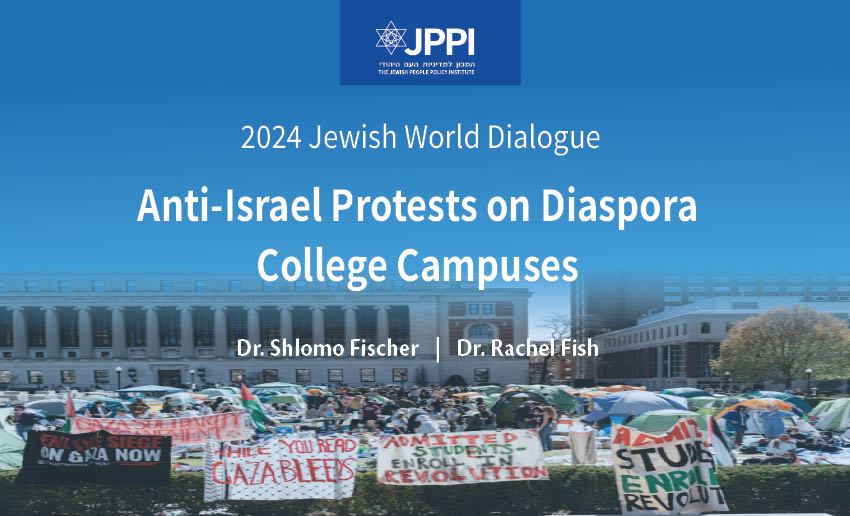.A new report reveals a disturbing reality on U.S. and European campuses since the October 7 attack: 78% of Jewish students reported harassment, alienation, and fear.
Dr. Shlomo Fischer and Dr. Rachel Fish
Dr. Shlomo Fischer and Dr. Rachel Fish

In 2024, a year marked by extraordinary turbulence, JPPI’s Jewish World Dialogue reasserted itself as a necessary and urgent undertaking. This report, Anti-Israel Protests on Diaspora College Campuses, comes at a time when the experience of being Jewish in the Western world, especially for the younger generation, is undergoing a seismic shift. The events surrounding and following the October 7 Hamas attack on Israel not only triggered war in the Middle East but ignited a firestorm of identity-driven polarization across American and global university campuses. What once felt like safe spaces for intellectual exploration have, for many Jewish students and academics, become battlegrounds of ideological and social exclusion.
JPPI, recognizing these evolving dynamics, gathered over a hundred participants for this year’s Jewish World Dialogue – mostly young adults under 35, but also older stakeholders whose families and communities interact with higher education – to examine the complex intersection of Zionism, Jewish identity, and progressive politics. Our aim was not to issue declarations, but to listen deeply, think critically, and understand the personal and communal implications of a dramatically shifting social landscape.
What we heard was both sobering and illuminating.
For many participants, the ideological promise of progressivism – grounded in liberal democratic values of social justice, freedom of expression, and equality – had been at the core of their Jewish identity. Yet, these very values have been wielded in recent years to ostracize Jews from progressive spaces. Progressive activism, once a natural fit with the Jewish moral compass, increasingly casts Jews – and particularly those who identify with or support Israel – as embodiments of White privilege and colonial oppression. The resulting dissonance is felt not only in the political sphere but in the most intimate spaces of daily life: classrooms, friendships, professional aspirations, and even family conversations.
This Dialogue revealed that many young Jews are struggling to navigate this rupture. Some have responded by asserting their Jewish identity more visibly, even defiantly. Others are reevaluating long-held assumptions about their place in the political and moral landscapes of their societies. Still others feel isolated – forced to choose between silence and misrepresentation. The concept of “intersectionality,” which once offered a framework for shared struggle, now often excludes the Jewish narrative or misrepresents it entirely.
Dialogue participants also interrogated their relationship with Israel. Contrary to assumptions that distance from Israel is inevitable among younger Diaspora Jews, our findings show a deeply felt connection – albeit one increasingly complicated by Israel’s political realities and global perceptions. Participants expressed a desire for honest, multifaceted Israel education that neither idealizes nor vilifies the Jewish state, but equips them with historical, ethical, and political nuance.
Equally striking is the degree to which many felt unprotected by university administrations and broader institutional frameworks. Reports of harassment, social ostracization, and institutional inaction were not one-off anomalies but recurring themes. Many participants described these experiences as formative – and not in the positive sense. They have altered educational plans, political alliances, and even personal relationships.
At JPPI, we believe that the Jewish future is not only about confronting external threats, but about cultivating internal clarity. Who are we, and how do we adapt with integrity in changing times? What are the boundaries of community? How do we foster pluralism without abandoning core values? This report does not pretend to offer final answers. Instead, it seeks to elevate the questions that must now be asked, with courage and care.
The Jewish World Dialogue is, above all, a process – a shared endeavor to understand what it means to live Jewishly in the world as it is, while envisioning the world as it could be. We are deeply grateful to the participants for their candor, thoughtfulness, and vulnerability. Their insights form the foundation of a conversation that must now extend beyond these pages.
In this moment of ideological tumult and identity politics, let this report serve as both a mirror and a window. A mirror reflecting our present struggles, and a window with a view toward a future of honest engagement, resilient identity, and renewed commitment to the collective journey of the Jewish people – our covenant of fate.
We are deeply grateful to the Dialogue’s talented and dedicated project heads, the authors of this report, Dr. Shlomo Fischer and Dr. Rachel Fish, both are JPPI senior fellows.
Prof. Yedidia Stern, President
JPPI